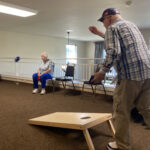By Amy McGarry
When I was a child in the early ‘70s, my family had a vast collection of vinyl record albums and 45s. I was taught from a young age how to gently set the record player’s needle at the right groove for the beginning of a song, including a stern lesson to never swipe the needle across the grooves. So, I was trusted to play records by myself.
In those days – I was just five or six years old – my still developing brain lacked the capacity for higher level thinking like metaphor or figures of speech. I could remember lyrics to songs easily. But I took all their lyrics literally. For example, “He Ain’t Heavy, He’s My Brother” starts with “The road is long, with many a winding turn….” A windy road was easy to picture in my innocent brain. The song also conjured an image in my mind of the singer literally carrying a man, his brother, draped over his shoulders. But it was easy for the singer, because the man wasn’t heavy at all. He wasn’t heavy because he was his sibling, his brother.
I too have a brother, along with my five sisters. My brother, Denny, is 18 years older than I. As I was growing up, he was making his way in the world. He rarely visited. But I liked him when he did visit. He was playful and had funny nicknames for me, like “Aimsworth,” and “Aimless.” When I listened to that song, I imagined myself carrying my own brother over my shoulders. He wasn’t heavy, but he was too large for a small child to easily carry.
About a year ago, out of the blue, my sister Shannon sent me a link to the song, with lyrics. I don’t think I had heard that song since I was a child in the basement with that tall stack of 45s. This time, as I listened and read the words carefully, my heart broke and I began to cry. Of course, now, with my adult understanding of metaphors and figures of speech, the song had a whole new meaning. Except, coming from my sister, the term “brother” was still intended to be our blood sibling.
“The road is long, with many a winding turn, that leads us to who knows where.”
As a child, I thought little of my big brother at all, except when I was taught how to push the correct button to accept a collect call from Monroe State Correctional Facility. Many a winding turn indeed. Later, he moved to California and fell in love with a woman who gave him a daughter and a son. But that relationship didn’t work out.
When I was 16, my brother moved back to Spokane to live with my parents and me. He needed to get clean and sober. He needed to get back on his feet. He did both. He graduated from Spokane Community College with a civil engineering degree. Countless times, my father expressed his admiration that my brother did what was necessary to move forward and never once showed any self-pity. In those years, my brother and I became friends.
Clean and sober, with his degree in hand, he moved back to California to be a civil engineer and a father to his children. He did both for years, contributing to the building of the new Stanford stadium. He eventually found great joy in being a grandfather.
When the time came, Denny chose to retire in Harrison, Idaho, which was much more affordable than San Jose, Calif. My brother enjoyed living alone. He enjoyed the nature surrounding his little house in the woods overlooking Lake Coeur d’Alene. His passion was walking the Centennial Trail along the lake below his house. He spent all year “training” for his favorite day of the year, Bloomsday.
Every summer, Denny hosted his sisters, nieces, and nephews when we wanted to play at the lake. He never went swimming with us, but he always barbecued hamburgers and hot dogs ready for us when we returned to the house. July 4th was especially fun because the hill behind his house provided the best viewing for the fireworks show.
The years went on and Denny got older. “It’s a long, long road, from which there is no return.” Then he was diagnosed with dementia.
My sisters and I are all too familiar with what that diagnosis means. My mother had Alzheimer’s, and my father had Lewy body dementia. How would it progress? Who would help him? His children in California were in no position to help. His few friends were in no position to help. All my brother had, has, is his sisters.
At first, my sister Mary took him in to live in her home. Denny was no longer comfortable living alone and was eager to move in with Mary; thankfully, offering no resistance. The other sisters, including me, helped out where we could. That system was okay when he was able to drive and to cook for himself and didn’t need 24/7 attention. But the disease progressed. After about a year, he could no longer drive, he no longer cooked for himself, and we didn’t feel comfortable leaving him alone. Mary has a job as a nurse, leaving Denny home alone for long periods. When Mary was home with him, the burden became more and more heavy. “But I’m strong, strong enough to carry him. He ain’t heavy, he’s my brother.” Mary carried him as far as she could, but she couldn’t be in two places at once.
Dementia can cause changes in personality and decision making. My brother insisted he was moving to California. He liked the weather better. His children and grandchildren were there. Oh, and he was planning to marry the mother of his children. My sister Marcia and I made several trips to San Jose with Denny over the course of many months, spending countless hours trying to help him set up his new life, to ensure his safety and well-being.
Two weeks after we left him in San Jose (against our better judgement), I received a phone call from Denny. Once again, the relationship didn’t work out. The mother of his children didn’t want to get married. She couldn’t take care of him. He wanted to come back to Spokane. I took time off of work, flew down to San Jose, and moved him back to Spokane.
He needed professional care. My sister Shannon took the lead on this difficult task. Denny didn’t want to live in an assisted living facility. He didn’t want to pay the exorbitant fees. He kept insisting he could live in an apartment by himself. He tried to insist he could drive. But when he had clarity on the severity of his condition, he finally agreed. It was a rough transition, with many calls begging to leave the facility. Thankfully, my brother has now adjusted to his life in an assisted living facility, close enough for sisters to visit weekly at the least; more often when there is a crisis, which still happens regularly. He is allowed to walk around the grounds of the facility and we have learned he has a talent for corn hole. They play competitively three times a week at the facility.
He called me just yesterday. I always panic when I see his name on my phone. Will he be having another paranoid delusion? Will he beg again to move out of the facility? Has he imagined that corn hole has been canceled? No, no and no. Yesterday he just wanted to know when the party will be. He remembered that we are having a birthday party to celebrate his 76th birthday in October. He remembered! He will probably ask us 20 times when the party is, even though it’s on his calendar, but at least he remembers we’re having a birthday party for him. And that we’ll be playing family corn hole!
He still remembers us, his sisters. For that we are grateful, as we are for when he has a good day, when he seems clear and cheerful. Other days… are harder. “So, on we go, his welfare is of my concern, no burden is he to bear. We’ll get there. He ain’t heavy, he’s my brother.”
Amy McGarry grew up in Spokane Valley, Washington. After a 20 year hiatus, she moved back to Spokane Valley where she lives with her husband, daughter and two cats. She is the author of I am Farang: Adventures of a Peace Corps Volunteer in Thailand, available on Amazon.com, Auntie’s Bookstore, and Barnes and Noble.


